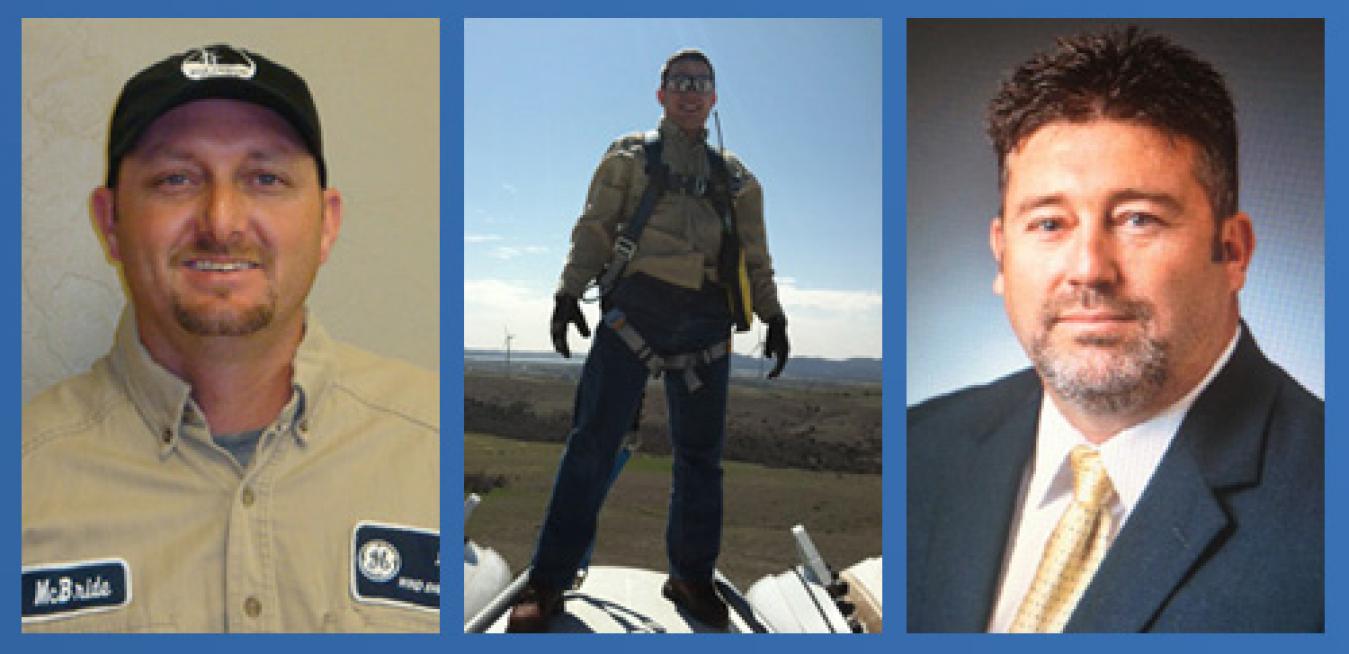Dennis McBride works as a GE technician servicing wind farms in Oklahoma’s tornado alley and knows a few things about wind. From early in the morning on May 20, he had a feeling that it would be a rough day. While out on the job at the Blue Canyon wind farm near Lawton, his phone kept buzzing in his pocket with severe weather alerts. Around noon his boss, Kenny Weaver, told him to secure equipment and go to a shelter – a dangerous storm cell was moving through the state. “The weather looked bad,” Weaver says. “Our work was pretty much done that day.”
The storm rolled right over the wind farm. But it saved its crushing blow for the Oklahoma City suburb of Moore, about an hour north of Lawton. Moore has since become a somber symbol for the ravages of severe weather.
Trained to Help: Dennis McBride (left) and Patrick “Codie” Lang (middle) spent two days helping Moore dig out and recover from a massive tornado. Kenny Weaver stayed behind and helped them pull through.
News helicopters tracking the storm were reporting the Moore devastation live on TV and McBride, who used to live in the area, realized the situation was serious. He and his colleague Patrick “Codie” Lang, a 21-year-old Navy vet who grew up near Moore, checked in with Weaver and prepared to head north.
They loaded a Ford pickup truck GE kept at the wind farm with clean water, cut-resistant gloves, headlamps, first-aid kits and a heart defibrillator machine. “We grabbed just about anything first-aid that we could get our hands on,” McBride says.
As GE wind technicians, McBride and Lang had been trained in personnel rescue and resuscitation, and they could safely operate at heights. But they did not know what to expect from a storm of this magnitude. “On the ride there, we talked to each other and tried to get our mind set on what was fixing to happen,” McBride says. “You prepare for the worst and move from there.”
Weaver, who stayed behind, reached the rescue command post in Moore on his cellphone and told the soldiers running it that McBride, Lang and another crew from northern Oklahoma were coming with help.
McBride and Lang arrived in Moore three hours after the storm hit. When McBride turned the pickup into the command post that had been set up in a Home Depot parking lot, he was shocked. “It was a scene that you never want to see,” he says.
They checked in with the soldiers at the post and because of their training and their helmets, head lamps, gloves and other protective gear they brought along, they were assigned to a fire brigade that had raced to Moore from Velma, Oklahoma, some 80 miles away.
McBride and Lang knew the area and the team soon started looking for survivors on an obliterated residential block near Interstate 35. “We went straight to the first house on the corner and started moving through the rubble, looking for anything and everything that might be there,” McBride says.
They searched for survivors, victims, and pets, peeling off the remains of soggy houses and shattered furniture, moving piles of bricks, and prying open crushed cars. They inspected black gaping basements while the firefighters used detectors to check for natural gas leaks. “The smell of this kind of devastation is like nothing else,” McBride says. “It’s the dirt, raw sewage from the shattered septic system, gasoline, food and water all mixed together. Pictures do it no justice.”
McBride and Lang agreed to call Weaver and check in with him every hour. Weaver had been living in Moore in 1999 when another devastating tornado tore through, so he knew their job would be hard. “I knew they may come across some things they’ve never seen in their lives,” Weaver says. “I had to make sure that they were safe and their heads were focused.”
The two kept searching through the rubble until the next afternoon, when they collapsed in the command post for a few hours of sleep. In the evening on May 21 they returned to their team and continued clearing the neighborhood for another day. They left Moore when the Oklahoma National Guard took over.
Back at work, Weaver set up McBride and Lang with counseling, but they were back on the job the same week.
Says McBride: “We were trained to help.”





